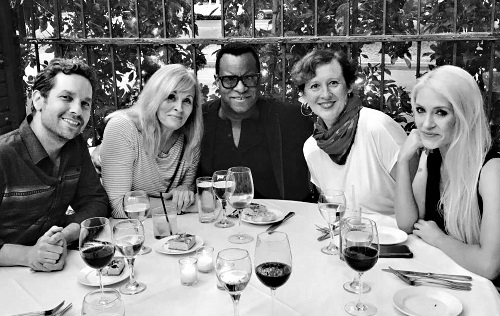How to Turn a Screenwriting Competition Win Into a Career

As most screenwriters know, it's difficult to break into the industry. Heck, it's damn near impossible — at least that's what it feels like.
Times have changed since the screenwriting boom of the 1990s. Since then, Hollywood has been flooded year in and year out by endless submissions and queries from all of the country and world.
During the double-punch of the WGA Strike and Economy Collapse in 2007/2008, spec sales plummeted. Studios were no longer giving out option deals. The industry as a whole became more risk-averse, shifting focus from original content to intellectual property — best selling novels, comics, sequels, remakes, reboots, etc.
It became more and more difficult for screenwriters to get their scripts into the hands of those that had the power to make their dreams come true.
Enter the screenwriting competition.
Competitions are one of the proven ways into the industry. Studios and production companies are using them more than they ever have to see where the cream rises — to use an industry phrase.
When you find yourself actually winning one, it's an amazing accomplishment to say the least.
But what happens then? How can screenwriters best take advantage of the winning situation they've been blessed to be a part of? We'll tackle those questions and more as we explore how screenwriters can turn a contest win into a career (we are particularly proud of these success stories).
1. Be Prepared Well Before You Enter
Your first script is always your worst, and you need time to hone your craft. You do that by learning. And you can only learn by making mistakes and learning from them. And you can only do that by writing, writing, and more writing.
Before you submit anything to any contest, be diligent with your potential submissions. Be meticulous as you work to lock that final draft — spelling, grammar, typos, etc.
Make sure that every scene description, scene, moment, and line of dialogue matter and need to be there.

Robert Bloch (1959), author of Psycho.
Most competitions offer excellent feedback options, and if you are entering your first couple of scripts to test them on the market, professional feedback can help you prepare for that career you long for.
Then you can take the time to write a more few scripts. Utilize the feedback you've received from the competitions, and as you write more, you'll suddenly have a couple of excellent prospects. And when you do, you'll take what you learned from them and apply it to the rewrites of those first two. Now you have 3-5 quality scripts in your pocket.
When you get those industry contact meetings and calls, the first question they will ask you after you've small talked about your winning script is, "What else do you have?"
You need to build your resume up to be prepared for a win. And you prepare yourself by having a stack of scripts that you can go to when they ask, "What else do you have?"
"Well, I've got an amazing contained thriller that's been making the rounds. I also have this contemporary adaptation of this classic public domain novel..."
You may just make your career right then and there if you prepare yourself for that question well before you even enter the competition.
2. Set Your Priorities
Some people are happy with the recognition of a contest win — "Someone read my script and loved it!"
Others are content with that recognition, along with the extra cash.
Others focus less on the cash prize and more on the industry access that you can get. To many, that is the true commodity of a win.
If a career in screenwriting is what you want, then industry access is the true prize.

ScreenCraft winner Ryan Smith, Diana Ossana (Academy Award-winning screenwriter of BROKEBACK MOUNTAIN), Geoffrey Fletcher (Academy Award-winning screenwriter of PRECIOUS), Kristina Reed (Academy Award-winning producer of Disney’s FEAST, as well as Disney’s FROZEN and BIG HERO 6) and ScreenCraft winner Anna Klassen.
If you win a contest, let the contest administrators know that you want to speak to as many of their industry relationships as possible. If you've won, they'll be excited about your script, so getting it — and you — out there should be their top priority as well.
3. Be Prepared for the Meetings
First and foremost, relax. R-E-L-A-X. Before you walk into that room or before you answer that industry call, just take a deep breath and relax. Calm yourself.

These producers, development executives, agents, and managers that you'll be speaking with are just regular people in extraordinary jobs.
You prepare yourself for these meetings by knowing your story. Know that winning script inside and out. Play any possible question they may ask in your head, and have a nice tight answer ready.
Be able to pitch your story within the confines of a couple of minutes. Be able to pitch your other scripts at the drop of a dime.
When they see that you know your work and you know the art and craft of screenwriting, they'll be more inclined to request your other projects and maybe offer you that coveted first writing assignment.
4. Know the Business
You should be reading the trades each and every day (Variety, Deadline, The Hollywood Reporter). You should know what deals are being made, what movies have tanked at the box office, what movies have surprised the industry, etc.

You should know what movies similar to your script have come, gone, and are in development — and you should be able to ascertain the difference between them and your script. And you should have an understanding of how much money the comparable films (or TV shows) earned and if they were critically acclaimed.
You should research each person that you speak with — and their company. Know what movies they've made. Know what movies they have in active development or pre-production. Ask them about those projects and show an interest in them.
The more you sound like an industry insider, the more they'll be inclined to want to work with you.
5. Understand and Embrace Rejection
Just because you've beaten hundreds of other contest entrants doesn't mean that you'll be served a career on a platter.
The initial meetings that you'll be a part of are nothing more than their search for a first impression. They want to see who you are, what you can do, what you've done already, and if those elements align with what they are looking for, great.
Many meetings in a screenwriter's career lead to rejection.
But always remember — Robert Zemeckis and Bob Gale shopped Back to the Future over forty times to no avail before Universal Studios finally said yes.

Rejection is part of the game. Understand that they can't all say yes. Understand that committing to a screenplay is a huge risk and investment for any major studio or company.
Embrace rejection and use it to get better. Ask yourself, "Why didn't they buy it? Why didn't they hire me? Why didn't I get a second meeting?" Learn from any mistakes you could have made. Ask for feedback from trusted friends and professionals.
And then move on to the next call or meeting with a clean slate and great attitude.
6. Realize That You Are Building an Industry Contact List for the Future
Let's say with your win you get five meetings or calls. That's five industry contacts more than you had before. That's five possible prospects you have to approach for your next script. That's five phone numbers and email addresses that you can file away and utilize for future script marketing.

If you've attended a meeting, who you come in contact with beyond the direct person you're there to speak with is also another possible contact for the future — so you could end up with ten or more industry contacts that you didn't have before all of this started.
You've constantly heard from disgruntled screenwriters, "It's all about who you know..."
Well, now you know more industry contacts than most ever will — and you have a direct line with them thanks to the in of winning a screenplay competition.
These six elements are all that you have control of in this film industry game — beyond writing amazing scripts.
The last key is knowing that when you've done all that you can do (see above), you place the burden of the outcome on their shoulders because they control who gets in and who doesn't. You have no say.
But if you go in already prepared with a few strong scripts in your pocket, if you set your priorities right, if you prepare for those meetings, if you know the industry and what's currently in play, if you use rejection as a tool of knowledge and learning as opposed to creating resentment and self-doubt, and if you build a strong industry network, you'll create an impression with those you meet with.
This is how careers start. This is how the gears begin to turn. This is how you will slowly find yourself in positions of opportunity that will inevitably arise.
The magic comes in moments of having all of that and then being at the right place, at the right time, with the right person. And you can create those opportunities thanks to that one — and hopefully more — screenwriting competition win.
Before you enter any of these contests, be sure to read ScreenCraft’s 7 Things to Do Before You Submit Your Screenplay to Anyone.
Ken Miyamoto has worked in the film industry for nearly two decades, most notably as a studio liaison for Sony Studios and then as a script reader and story analyst for Sony Pictures.
He has many studio meetings under his belt as a produced screenwriter, meeting with the likes of Sony, Dreamworks, Universal, Disney, Warner Brothers, as well as many production and management companies. He has had a previous development deal with Lionsgate, as well as multiple writing assignments, including the produced miniseries Blackout, starring Anne Heche, Sean Patrick Flanery, Billy Zane, James Brolin, Haylie Duff, Brian Bloom, Eric La Salle, and Bruce Boxleitner. Follow Ken on Twitter @KenMovies
For all the latest ScreenCraft news and updates, follow us on Twitter and Facebook!
Tags
Get Our Screenwriting Newsletter!
Get weekly writing inspiration delivered to your inbox - including industry news, popular articles, and more!



























